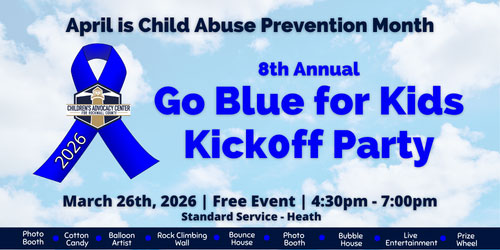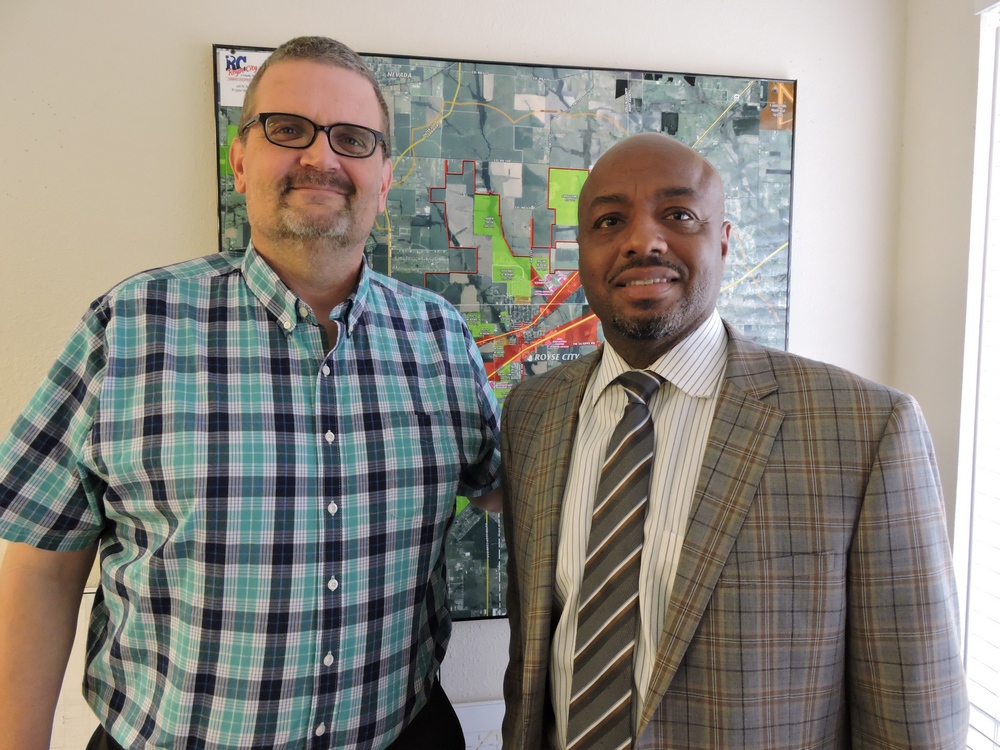
(ROYSE CITY, TX — October 3, 2017) A prospective kidney donor and recipient call it faith—not fate—that brought them together in a hallway at City Hall in Royse City early one morning in April.
That’s the best explanation that Carl Alsabrook and Jesse Vaughn have for their face-to-face meeting in a hallway after an early-morning meeting of the Royse City Community Development Corporation’s (CDC) Board of Directors.
Alsabrook, city manager of Royse City, shocked Vaughn with an offer: “If I can help you, I’d like to offer you a kidney.”
“I just stood there,” Vaughn said. “I was blindsided because I barely knew the city manager.”
The 48-year-old Vaughn, facing Stage 5 renal failure due to a degenerative kidney disease, said he was overwhelmed and didn’t have an immediate response.
“I didn’t say anything for a minute,” Vaughn said. “I just looked at him.”
Vaughn, a Rockwall resident who is a financial advisor for Edward Jones Investments in Royse City, finally accepted Alsabrook’s offer. After months of medical tests, transplant surgery that will give Vaughn new life is near. Surgery is scheduled for Friday (Oct. 6).
The journey leading to surgery has been a long one for Vaughn and a short one for the 50-year-old Alsabrook, a former law enforcement officer who served as a Rockwall County sheriff’s deputy for three years and a Rockwall Police Department officer for 20 years. He was named Royse City police chief in 2010 and became city manager in 2012.
Vaughn learned in 2007 that his kidneys were failing. A doctor reported in June of 2014 that he was in Stage 5 renal failure and that his kidneys were functioning at 19 percent. Later, his kidney function dropped more, to 6 percent. The journey even took him to China, where he received herbal treatments. He’s been on dialysis for nine months.
“I was severely depressed,” Vaughn said. “I was overwhelmed by the idea of spending four hours in that place (the dialysis center) three days a week. It was overwhelming.”
Vaughn said his plan was to remain on dialysis “until a kidney shows up.” He was on a transplant list, along with more than 100,000 others nationwide. He expected his wait to be at least three years.
“When you’re doing dialysis, you’re expecting a kidney some year down the road from someone who gets into a fatal accident,” Vaughn said. “I was going through the motions, going to dialysis, praying for healing, praying for God to heal me. I never prayed for a kidney. I just wanted to be healed. I never prayed for a donor because I thought somebody had to die. I kind of avoided that.”
CDC Executive Director Larry Lott told Alsabrook about Vaughn’s medical issue in early April. Vaughn was scheduled to participate in a CDC trip to Las Vegas, but couldn’t because of his illness.
That news bothered Alsabrook, saying that he knew Vaughn was a family man with young kids.
“That’s just not good,” he said. “That’s sad.”
He continued to think about Vaughn.
“It impacted me greatly because Jesse has always been positive, upbeat, with more energy than I’ve ever had,” Alsabrook said.
The city manager said he knew he was supposed to help Vaughn and he felt peace with every thought about helping him. Help could come with a financial donation, he thought, or a campaign to enlist prospective donors. And, yes, he thought about the possibility that he would become a donor.
A few days later, he saw Vaughn walking on Royse City’s Main Street. Vaughn, he said, didn’t have that normal bounce in his step.
“That’s when it all came together in my mind,” he said. “God spoke to me and said, ‘You can help. You can fix it.’ It was shocking. It shook me up a little bit.”
There’s no question in his mind, Alsabrook said, that God spoke to him.
“I don’t know if he’s ever talked to me before, probably has, but never listened,” he said.
He talked to Lisa, his fiancé, telling her, “I think I’m going to offer something crazy.” She was supportive. They even moved their wedding date up to Aug. 5 because of the possibility of upcoming surgery.
On the morning Alsabrook and Vaughn had their hallway meeting, Vaughn, a member of the CDC’s Board of Directors, had stayed around after the meeting to talk briefly with Lott. Alsabrook chuckles when he admits that he left his office and was headed to the CDC meeting room to see if there were any pastry items left over from the CDC meeting. He saw Vaughn before he made it to the pastries.
“It just so happened that day, through my hunger for pigs-in-a-blanket and his decision to talk to Larry for a few minutes, we came face to face,” Alsabrook said. “If we hadn’t that day, I don’t know. Would I have lost my nerve? Would it have never happened? No, I would have not lost my nerve. It would have happened.”
Vaughn also questions what would have happened had he not met with Lott.
“I think about that a lot,” Vaughn said. “God was ordering my steps, even that day. Twenty steps and I would have been out the door.”
After Alsabrook made the kidney offer, Vaughn said he told him that the transplant process was not that simple. There would be lots of testing, blood matching and tissue matching.
The first test was passed during their hallway conversation. Both have O-positive blood type.
“At that moment, I knew it was going to work,” Alsabrook said.
Many other tests followed. The results of every test moved the transplant a step closer.
Alsabrook said there are seven rejection factors. Doctors can work with up to four, but they had zero.
A major test was Alsabrook’s kidney function. His kidney function score had to be at least 96 percent. His percentage caused the medical experts to think that mistakes had been made because Alsabrook’s kidney function went from 210 percent, to 217, to 232, to 245.
Race is also part of this miracle. Doctors had told Vaughn that a white male would be the best donor candidate. Vaughn said he was told that white men were less likely to get sick later with diabetes or blood pressure problems. Vaughn is African American, Alsabrook is white.
“I had concerns about what would happen to him health-wise because I don’t want him to get ill with one kidney,” Vaughn said. “So, I had to really learn more what his process and journey would be like.”
Both men agree they don’t want attention. Alsabrook said the spotlight should be on Vaughn, his hero. But Vaughn insists that the focus should be on Alsabrook—an “angel.”
“The hero to me in this situation is Jesse,” Alsabrook said. “He’s been here throughout it. How he’s processed it, he’s been a positive force in our community for many years. He’s never complained.”
Vaughn points to Alsabrook as a selfless person who responded to his need when others would not.
“He’s amazing,” Vaughn said. “That’s because, I think, he’s an angel.”
Even though both prefer to be out of the spotlight, they’re telling the story because they want other people to be inspired to be donors. Alsabrook said there are about 101,000 people waiting for a kidney. He said 36,000 people are added to the waiting list annually. He said 13 people on that list die each day. About 10 lose their spot on the list daily because they become too sick to accept donations.
“We need more people to donate,” Alsabrook said. “No question.”
Story and photo by Blue Ribbon News contributing writer Jim Hardin.
 Our monthly print edition is delivered free to 19,000+ homes in Rockwall and Heath, TX.
Our monthly print edition is delivered free to 19,000+ homes in Rockwall and Heath, TX.
To share your good news and events, email editor@BlueRibbonNews.com.
Subscribe to our email newsletter here.
Advertising: 214-342-8000 or advertising@BlueRibbonNews.com.








